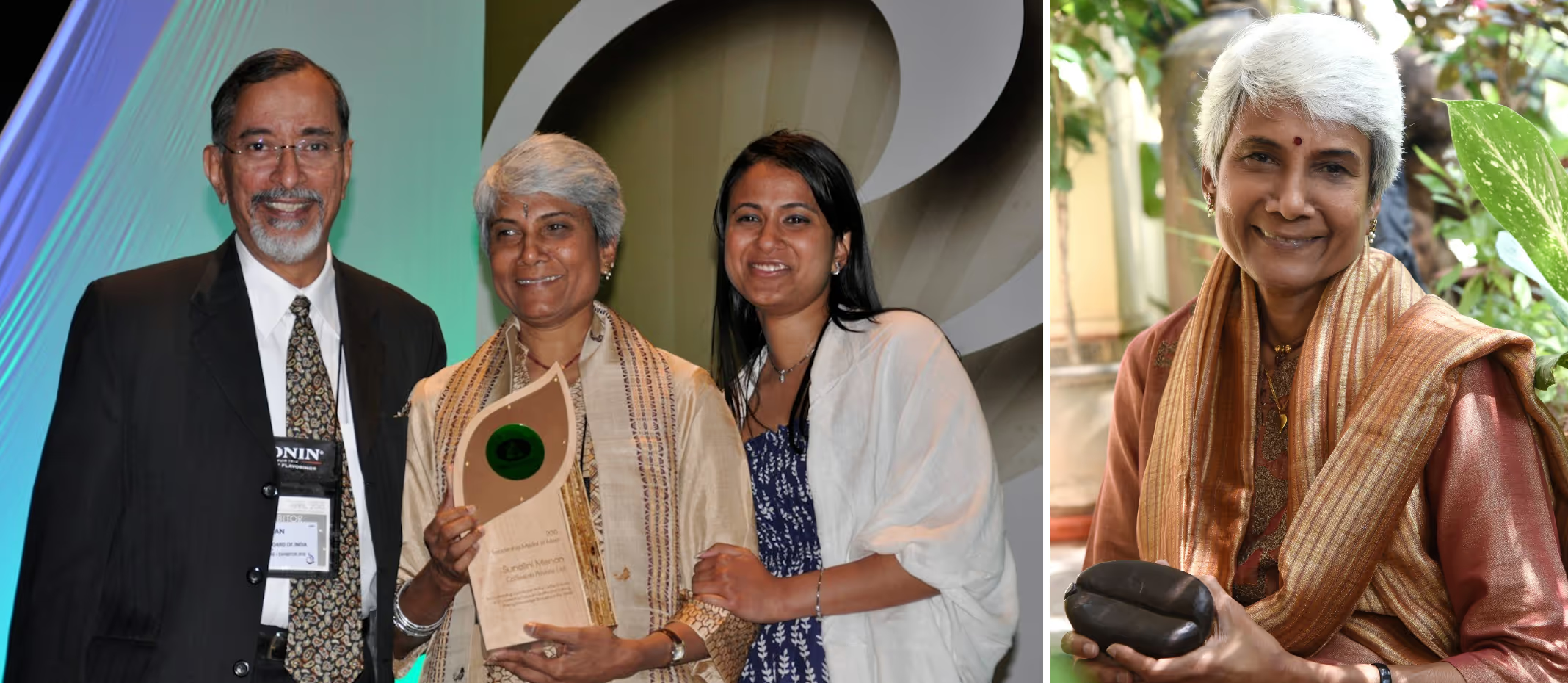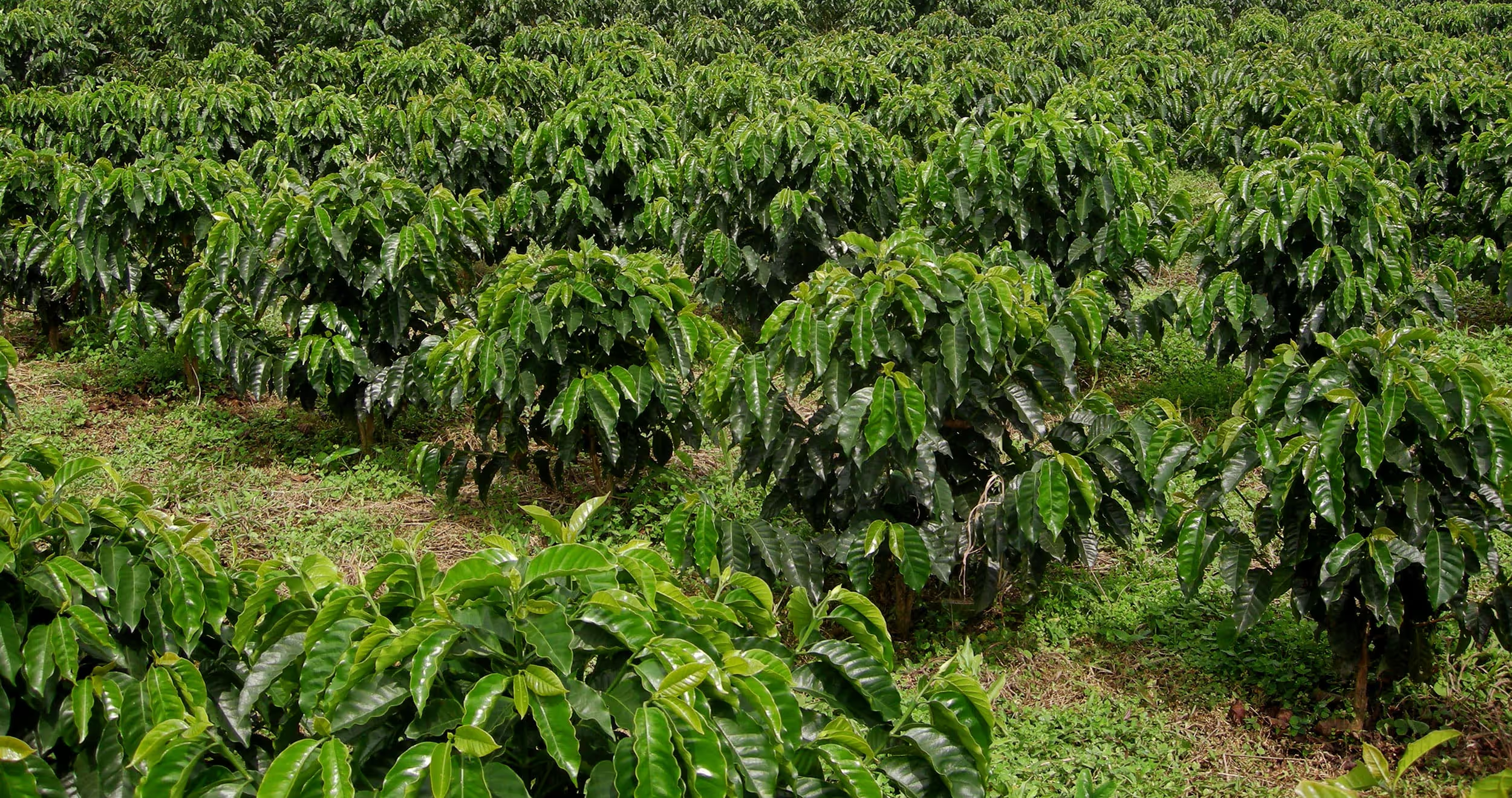
A Childhood Infused with Coffee Aromas
Sunalini Menon's journey into the world of coffee began not with a professional ambition but with a childhood steeped in aromatic memories. Growing up in India with her sister under their grandparents’ care, Sunalini was constantly surrounded by the rich, enticing scent of coffee. “Every day, we woke up to the delicious smell of coffee wafting into our nostrils,” she recalls.
Her grandmother, a devoted coffee connoisseur, had a weekly ritual of selecting her blend of roasted coffee beans, grinding it freshly every morning, and brewing them with an Indian filter. “She would drink her coffee from a large ‘Sombu’ mug, which is a mug with a long neck and can hold up to 400 ml of liquid”, Sunalini remembers with a smile. Despite the allure of the coffee aroma, her grandmother refused to give them coffee, believing that children should only drink milk to build their health and strength. This was a rule Sunalini and her sister sought to get the better of the situation. “We begged for a small cup of coffee. She promised to give us a few drops the next day if we behaved. This marked the beginning of my coffee story.”
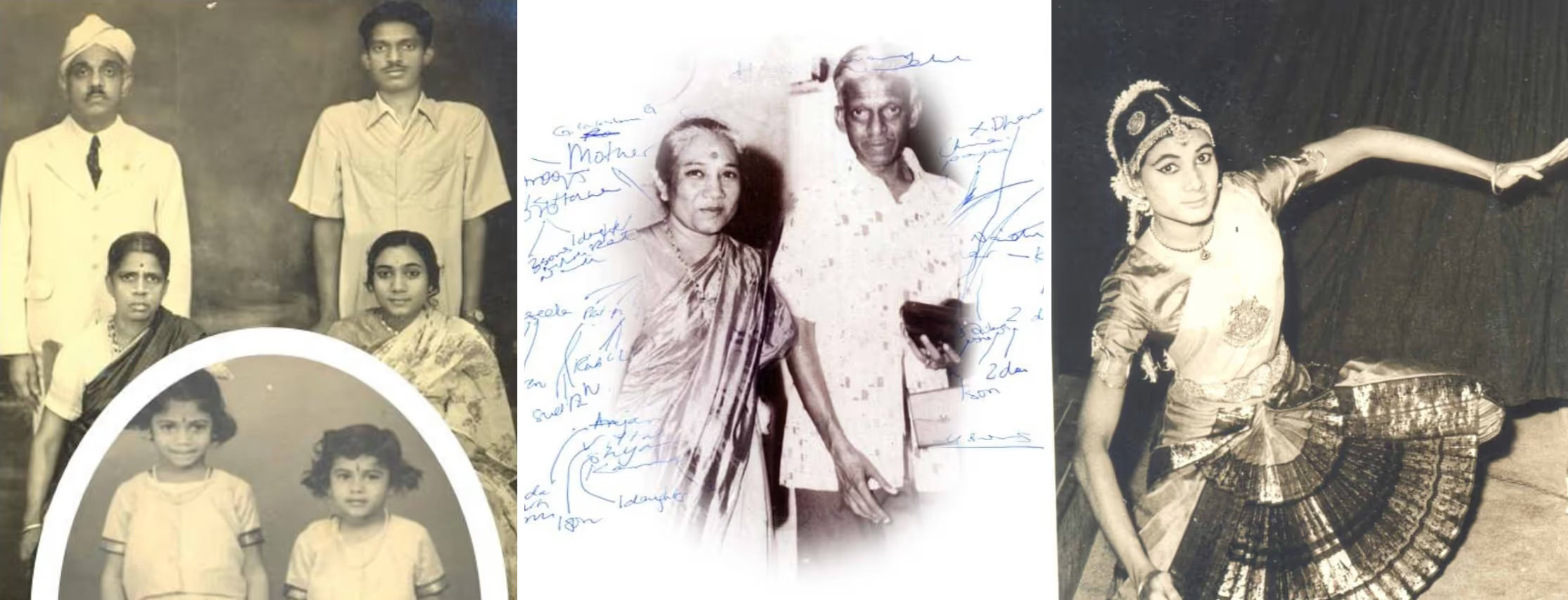
A New Career
Initially pursuing a career in Food Technology with plans to become a dietician, Sunalini’s career path took a surprising turn when she came across an advertisement for an Assistant Cup Taster at the Coffee Board of India. The position rekindled her childhood memories of coffee and cupping sessions with her uncle. “The job description reminded me of waking up to the smell of coffee and traveling to tea plantations where I would imitate my uncle’s sipping, slurping, tasting, and spitting techniques,” she recalls.
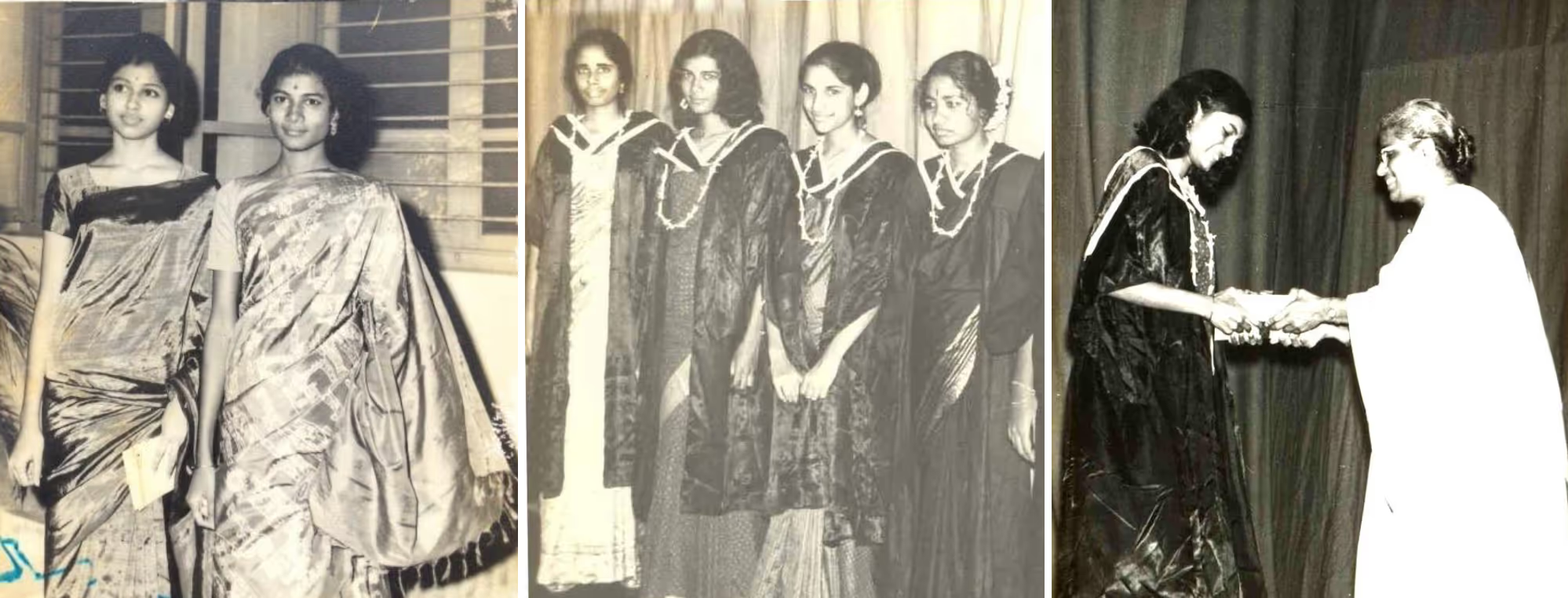
Although she had a scholarship to study dietetics in New York, Sunalini chose the Coffee Board position, despite skepticism about hiring a woman for the role. “At that time, women in India led very sheltered lives, often staying with their parents, or getting married. My parents were initially worried at the thought of me leaving for New York. Choosing a career in coffee allowed me to stay with them, which made them happy and influenced my decision to take the job.” This marked the beginning of her journey in the coffee industry.

Connecting with CQI: A Mission to Improve Quality
Sunalini's connection with Coffee Quality Institute (CQI) dates back many years. Drawn by CQI’s mission to improve coffee quality and the lives of those who produce it, she joined the Coffee Corps Volunteer program, which took her to various countries in Africa to carry out training programs. This involvement allowed Sunalini to gain a deep understanding of the challenges and aspirations of coffee farmers, the unique qualities of their coffees and how quality improvement can positively impact their lives. “CQI has played an important role in building my career in coffee. It has taught me about the importance of coffee quality and its potential impact on the livelihoods of producers, roasters, exporters, and consumers,” Sunalini reflects.
Becoming India’s First Q Grader
In the early 2000s, Sunalini became India’s first Q Grader, a milestone achieved through extensive cupping practice and training in Switzerland, Germany and other coffee producing countries. “This was followed by the innumerable cupping sessions I participated in with cuppers from around the world,” Sunalini explains. “I observed, tasted, imitated, and understood coffee from their perspectives, learning how they evaluated the various attributes and nuances in the coffee cup.”
Guided by mentors like Dr. Ernesto Illy, Kenneth Davids, Erna Knutson, and Mary Williams, Sunalini improved her skills in coffee tasting and evaluation. Becoming the first Q Grader in India significantly impacted her career, as this role helped her master the complexities of coffee cupping and shape how she communicated quality to both producers and consumers. “CQI helped me learn to convey to producers the strengths and weaknesses in their coffee and how to enhance the positives and reduce, if not eliminate, the negatives,” Sunalini notes.
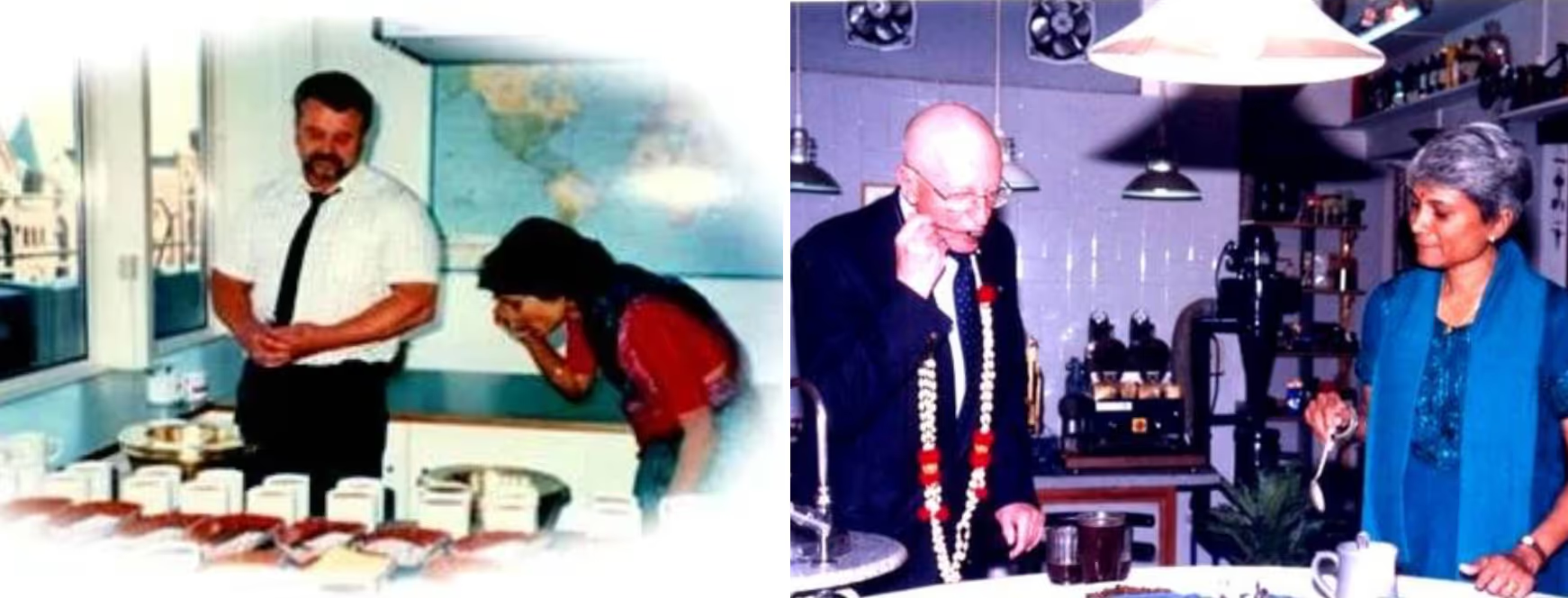
Serving on the CQI Board: A Commitment to the Mission
Since joining the CQI Board in June 2018, Sunalini has worked closely with farmers and stakeholders to advance CQI’s goals. Influenced by CQI’s mission and fellow board member Shirin Moayyad, she remains dedicated to improving coffee quality and supporting the global coffee community.
Advocating for Robusta Coffee
“I am a huge advocate of the Robusta bean. It is a species entirely different from the Arabica and needs to be respected and admired for its own intrinsic value,” Sunalini explains. “Very often, Robusta is considered a poor cousin of Arabica, which I think is a misnomer.” Sunalini played a key role in developing standards for Robusta. In 2009, she was invited by Ted Lingle to help create these standards in Uganda, working alongside tasters from various producing countries. “It was closed door event where we tasted these attributes and finally, formulated the cupping protocol, the standards for Robusta, the defect classification, and the scoring system for the Robusta bean.”

Evaluating Robusta vs. Arabica: A Unique Perspective
Sunalini highlights the distinct differences between Robusta and Arabica coffees. While Arabica is known for its brightness and acidity, Robusta offers a smoother, more rounded profile with a notable bitterness due to its higher caffeine content. She emphasizes the importance of understanding and respecting the unique qualities of each species and adapting evaluation methods accordingly.
“When evaluating Robusta and Arabica, we need to use a different yardstick,” Sunalini says. "That's why there are specific cupping protocols for each. The attributes of the two species must be assessed individually considering their varied aromas and flavors. Cupping Robusta next to Arabica can skew the sensory evaluation and misrepresent the individual qualities of each.”
Despite its reputation as a lower-quality bean, Sunalini notes that Robusta can match, or even surpass, Arabica in value when attention is given to varietal, altitude, processing methods, fermentation and presentation. She highlights several benefits of Robusta, including its resilience in diverse environments and greater resistance to pests and diseases, thanks to its high caffeine content. Robusta also enhances the crema and smoothness of an espresso and is versatile across various brewing methods, instant coffee production, and even in cosmetics and energy drinks. Importantly, Robusta has been crucial in coffee genetic research, contributing resistance to coffee rust and other pests for improved Arabica varieties. "Robusta increases the diversity of available coffees. It is often less expensive than Arabica, presenting an opportunity to develop premium Robustas for consumers seeking high-quality coffee at a more accessible price point.”

Inspiring the Next Generation of Coffee Professionals
Sunalini’s passion for coffee processing led her to a new chapter in her career as a CQI Post-Harvest Processing Instructor. “Early in my coffee career, I recognized the role of processing in determining coffee’s taste profile. My interest in experimenting with processing, fermentation, drying, and the methods of packing and storing coffee drove me to become an expert in this field," she explains.
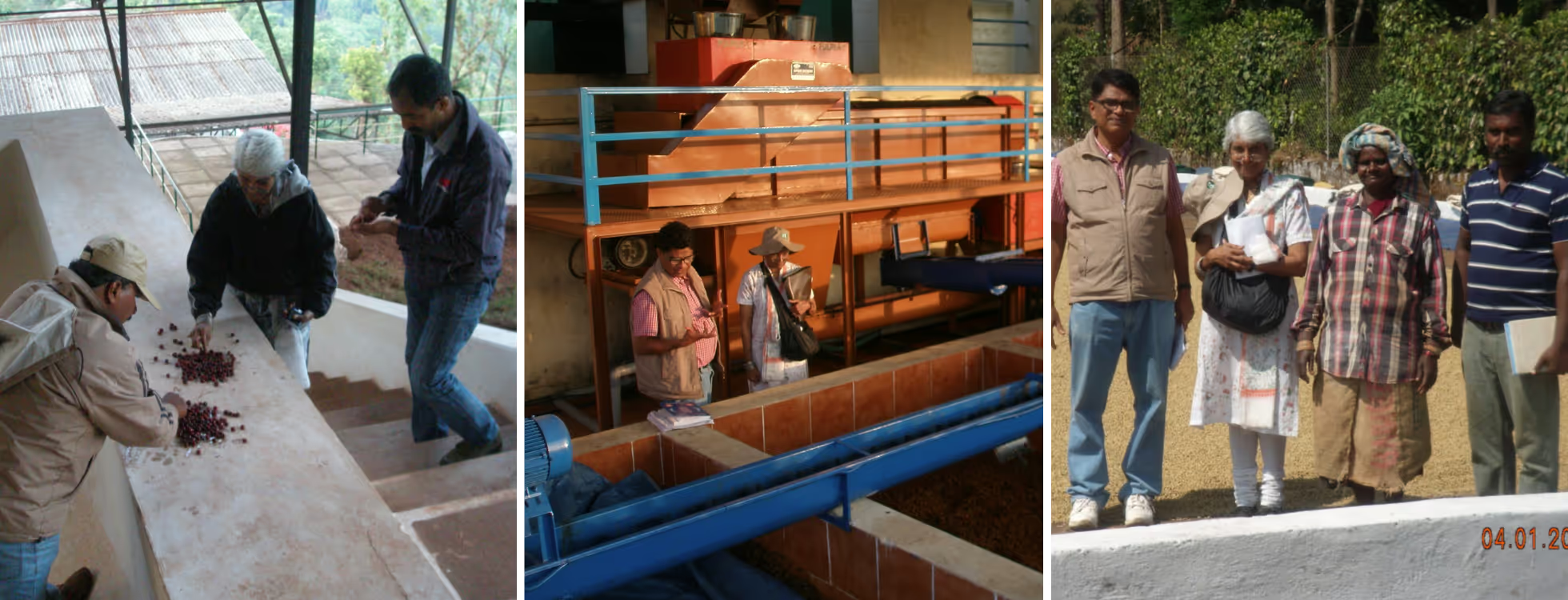
The Q Processing Professional Instructor Course is well designed for this purpose, combining the theoretical and practical aspects of processing and how it affects the quality and taste profile of the coffee cup. “It’s been both exciting and deeply fulfilling”, Sunalini says. “CQI Instructor Yimara Martínez Agudelo inspired me to take on this challenge and helped me understand that teaching others about coffee processing is as important as mastering it myself.” Sunalini is proud to be the first woman in India to become a CQI Post-Harvest Processing Instructor.
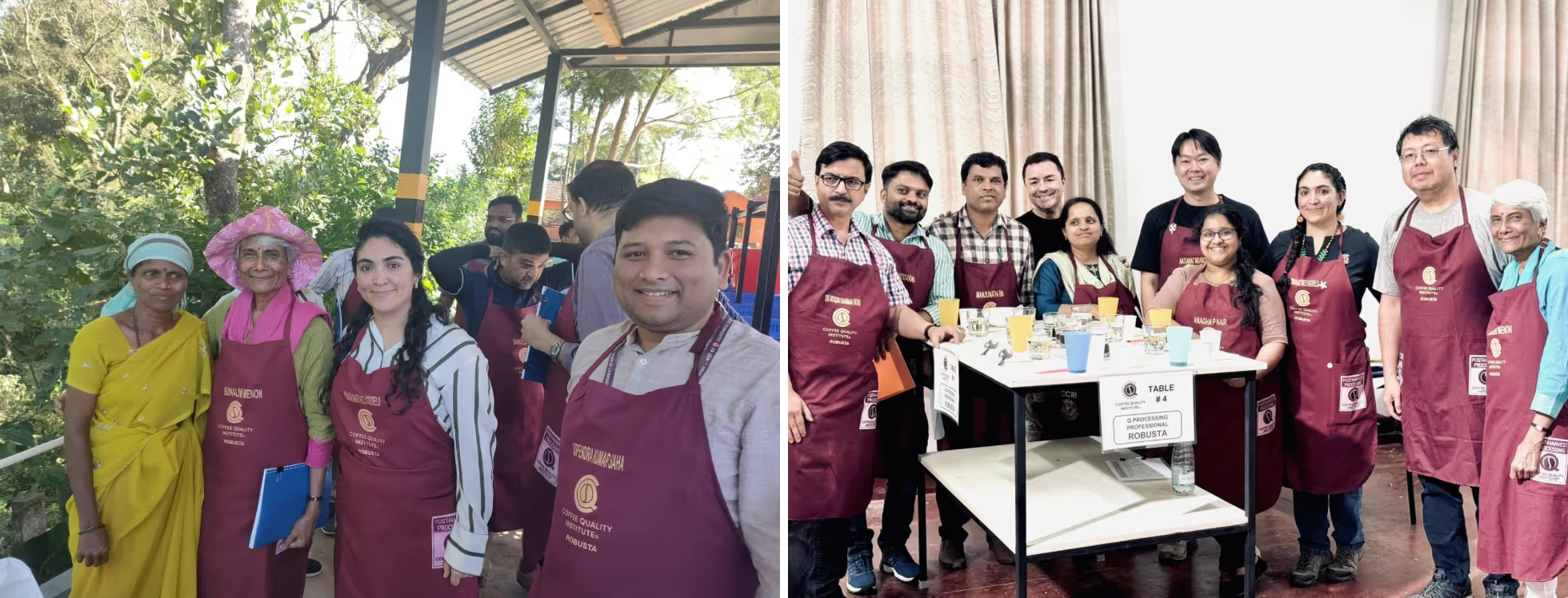
The Future of Coffee in India
The Indian coffee industry is undergoing a significant transformation. “The Indian coffee bean is no longer a shy, homebound product,” Sunalini shares. “With the rise of cafes and coffee education, the Indian coffee bean is making a global impact.” Farmers are participating in international events, and some have even opened cafes abroad. The Indian coffee sector is becoming more visible and influential on the global stage.
Supporting and Promoting Indian Coffee
To support and promote Indian coffee, Sunalini suggests engaging with local coffee farms, experiencing “home stays,” and participating in coffee tours. The global community can contribute by fostering dialogue with Indian farmers, visiting their farms, and understanding their coffee’s unique qualities.
As we celebrate Sunalini’s journey in coffee and her contributions to CQI, we extend our deepest thanks. Thank you, Sunalini, for inspiring us and transforming the industry in such a unique and impactful way. We are immensely proud and honored to have you as part of the CQI family and are in awe of how you've positively impacted so many people in India and beyond. We look forward to witnessing your continued influence in the coffee world.
